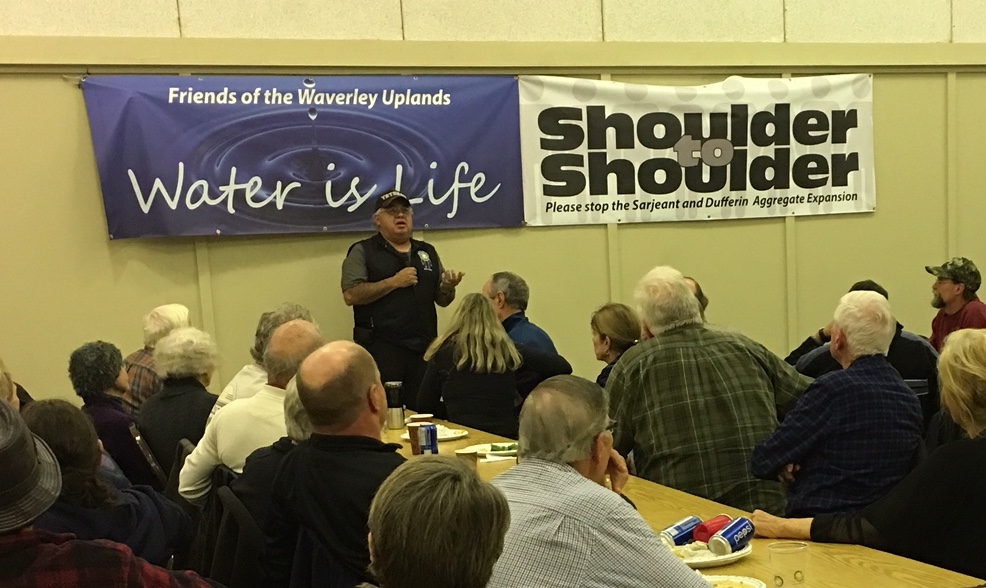Water Walkers group grows

Jeff Monague -AWARE Simcoe photo
By Cheryl Browne, Barrie Examiner
TINY TWP. – Choosing from tables laden with potluck offerings, more than 100 people with sore feet sat down to enjoy the community feast.
The high-ceilinged Wyebridge Community Hall echoed back the laughter and buzz of conversation as both strangers and old friends relived their weekend adventure.
Asked why she had taken part in the almost 40-kilometre walk from the Christian Island ferry dock to the Dufferin Aggregates gravel pit on Darby Road, Mary Jane Morgan of AWARE Simcoe put her fork down to answer.
“The world is watching us,” Morgan said. “We have some of the purest water on the planet and we have to speak up and protect it.”
The Morgans, and many others in the room Sunday night, have fought this fight before.
And won.
When a garbage dump was proposed on land above the Alliston Aquifer or Waverley Uplands, an ad hoc group of farmers, environmental activists and Indigenous people came together to defend the water.
Their protest paid off when Simcoe County council decided to defer Site 41 and eventually scrapped the idea altogether.
Earlier this year, Dufferin Aggregates, a division of CRH Canada Group, bought the land and water-drawing licence by the Ministry of Environment and Climate Change from K.J. Beamish and began to draw about 300,000 litres per day to clean the aggregates it uses to manufacture cement and asphalt.
The licence states Dufferin can pull as much as $1.6 million litres per day until it expires in April 2018.
Area farmers say they have noticed water-quality issues with their wells, and both AWARE Simcoe and Vicki Monague of Beausoleil Island First Nations put out the call to get the old gang back together to fight for the aquifer again.
“We pulled this together in two weeks. About 80 people walked portions of the walk each day and we made it to 40 Darby Road this afternoon,” she said of the Dufferin Aggregates gravel pit.
“The majority of the people have some knowledge of the aquifer and for others, we’re expanding their knowledge,” Monague said. “Actually, once you mention Alliston Aquifer,” she pointed at the full hall, “this is the response you get.”
Elizabeth Brass Elson, of the First Nation Women’s Water Commission, not only demonstrated at Site 41, but also camped out at Springwater Provincial Park for six months after the Ministry of Natural Resources (now the Ministry of Natural Resources and Forestry) declared the 193-hectare park non-operational in March 2013.
Beausoleil First Nations reached a five-year deal with the MNR to remain caretakers of the park and now offer Indigenous education courses.
Once the potluck dinner was finished, Brass Elson admitted she has set her sights on ensuring the aquifer is saved from industry.
“Water is life. It should be a concern to everyone,” Brass Elson said. “Why should industry be allowed to use pristine water? It still disturbs the aquifer.”
Dufferin Aggregates spokesman Kevin Mitchell said there are no chemicals used in the gravel-washing process and that most of the water used evaporates or drains back into the ground.
But environmental scientist William Shotyk, Bocock chairman of Agriculture and the Environment at the University of Alberta, has been testing the water purity for the past 25 years on his parent’s Tiny farm.
Shotyk has three dedicated wells to determine the water’s purity.
He said he has used it as his reference water to test other water samples during his tenures at Switzerland’s University of Bern and the Heidelberg University in Germany.
“The water has remarkable purity,” Shotyk said from Alberta on Monday. “There’s absolutely no question it’s cleaner than the Arctic ice. It’s so clean, I have to filter the air when I test it because I don’t want impurities from the air in my tests.”
Shotyk has recently appeared at meetings with Tiny and Springwater township councils urging officials to protect the water.
Simcoe County Warden Gerry Marshall met with the walkers, enjoyed the meal and spoke briefly to the assembled about his upcoming involvement.
Marshall said he would contact officials in the Tiny, Tay, Springwater and Oro-Medonte townships to determine if the water should be protected and what is being done.
“We need to have an educated conversation and I need to get up to speed on what’s been going on,” Marshall said, who was recently named the Simcoe North Liberal candidate for next year’s provincial election.
“Now, because I’m a Liberal candidate, I can call some ministers and see what’s happening,” he said.









Leave a Reply